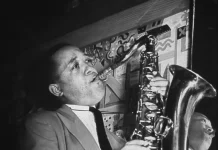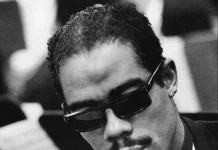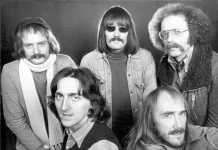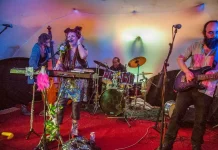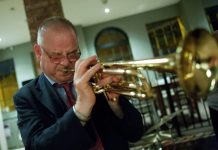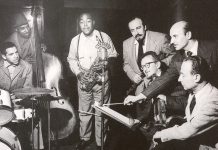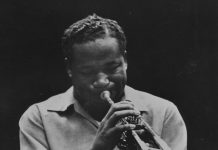Poor David D, of Tel Aviv, was obliged to downgrade his star rating for Paris jazz club Caveau de la Huchette because the place was “packed like sardines” with “a waiting line a mile long”. Will B, from Solihull, however, enjoyed its “hot, sweaty, loud jazz music” and swooned at “the entire vibe and atmosphere”.
Something about the tone of these comments suggest that both Dave and Will were tourist idlers, wandering around and chancing on a place that looked interesting, like the nearby Panthéon, Notre Dame Cathedral, and the Shakespeare & Co bookshop. David’s visit was OK the first time, when the Caveau was presumably not stuffed to the rafters. Paris and jazz: they go together, don’t they?
These entries from the club’s website remind me of the friend who, on a visit to London from the benighted sticks, “had to go to” Ronnie Scott’s, where he enjoyed a performance by Kurt Elling. Needless to say, he’d never heard of Elling (not all my friends like jazz) but was “bowled over”. Needless to say, also, that being “bowled over” has not encouraged him to seek out Elling recordings, other Elling appearances, or, indeed, any other jazz act. The burr didn’t stick.
A small rural music festival near me condescended to jazz – a bit like BBC Radio 3 sometimes does – by inaugurating a jazz night, for which a converted barn would “become Ronnie Scott’s”. This could only have been described as such by someone who’d never been within 50 miles of Frith Street. One might have been charitable and said that, well, it was a start. But it’s the kind of “start” that in jazz so often has no progressive development. I think the festival dropped the idea after a bit.
Before I passed it one lunchtime on a visit to the City of Light (it rained, and was enveloped in a mist that seemed to rise from a miasmic River Seine), Caveau de la Huchette – a huchette is a wooden protector for arrow slits (!) – appeared, like all things do when you are wandering in a city, as moving towards you with everything and everyone else. I stopped – it stopped – because I knew of the club though had never visited, and it was closed.
For me and for Dave and Will it was serendipitous: a delightful chance find; well, delightful for me because I knew what the place entailed, and delightful for Dave (the first time) and Will once they’d explored. Serendipity is both stimulus and consolidation. A university pal of mine used to own a 78rpm disc of the Quintette du Hot Club de France playing I Saw Stars and, if I recall accurately, Swing Guitars. It was never played but kept in a straw-lined giant Camembert box as a source of private reverie. He’d come across it by accident in a junk shop, as they were then called before the word “collectibles” was invented.
Having holidayed in St Ives, Cornwall, since the time when Beatniks lit night-time fires on Porthminster beach and spoke Ginsberg out loud, I’ve divined the palpable connection between the arty types there and jazz
Serendipitous happenings often seem to be lying in wait for your personal discovery. Among a leaning tower of 78rpms in a friend’s shed – they belonged to her father and she wasn’t even remotely interested – were Reginald Ketelby (In A Persian Market), Charlie Kunz (Smoke Gets In Your Eyes), the Rovers Dance Band (Like A Virginia Creeper), the All-Star Ceildhe Band (The Red Haired Boy Hornpipe), and Victor Payne (All By Yourself In The Moonlight), and – serendipity alert – the Original Dixieland Jazz Band (Jazz Me Blues). It was a happenstance moment for me but also a salutary one in that I realised the ODJB’s was the only disc in that Pisa pile that I tweezered out with thumb and forefinger to examine more closely: no visible damage and numbered HMV B1257. I could have kept it, but with no means of playing the thing I would have needed a large Camembert box, a lining of straw, and a willingness to find out from eBay how much it was worth. No doubt some retro company somewhere would have sold me a disc-player and a set of needles, and could probably still do so.
Having holidayed in St Ives, Cornwall, since the time when Beatniks lit night-time fires on Porthminster beach and spoke out loud the verse of Allen Ginsberg while locals locked themselves away, I’ve divined the palpable connection between the arty types there and jazz. Its jazz club at the Great Western is one of the farthest flung but most famous in the country. Last time I was there I heard saxophonist Greg Abate three days before a serendipitous moment awaited me at the pottery where Bernard Leach revolutionised the ceramic arts in the UK with help from the Japanese. In a side room was a small jazz exhibition, I think mounted by one of the Leach fraternity to illustrate a personal love of the music and/or the town’s jazz links. Old copies of Jazz Journal were fanned out on a shelf.
Jazz discoveries are often unforeseen. Years ago I was on duty at my newspaper in South Wales when I retrieved a scribbled message from a litter bin. It had got there accidentally with the document I was looking for. Or perhaps it had been thrown away by someone for whom a headline on a jazz piece was always “All that jazz…” It was from a friend of saxophonist Lol Coxhill living in the town who wondered if a gig by Lol might go down well in Newport. I can’t remember why he’d want to travel from London, apart from the possibility of doing a favour for the friend. Anyway, I phoned the contact and interviewed Lol on the phone for a short feature. He wasn’t on the Bilk-Ball podium of fame for our readers. A gig was organised and I reviewed it. In a place where incomprehensible arts events were affronts likely to result in breaches of the peace, this one was worth remembering.
It also opened up yet another avenue of jazz bounty. I expect that more await me. The very first one was a shock: finding myself in the pier theatre at Southsea as one of just a dozen punters listening to Ken Colyer’s Jazzmen playing the most exciting music I’d ever heard. Among the much later ones was the eureka moment of wondering why there were no young black musicians in the line-up of Loose Tubes – the question hadn’t previously occurred to me – and worrying that the answer was one I didn’t care to entertain unless I wondered why, back in the day, the Ken Colyer Jazzmen were all white.
I’m beginning to wonder if anyone on the stage deserves to be there for extra-musical reasons and it’s good that I wonder
Any reader of this magazine who doesn’t know what the so-called “Martin Speake incident” is about should look it up on the internet. An article on the Music Teacher website – “Jazz professor boycotted by London students” – gives a fair summary. The issue boils down to whether or not the UK jazz scene is racist and whether or not you can say it is or isn’t – i.e., exercise freedom of speech – without being cancelled: that’s cancelled as in “cancel culture”.
From my position in the audience, I’m beginning to wonder if anyone on the stage deserves to be there for extra-musical reasons and it’s good that I wonder. Of course, if they’re crap musicians they don’t deserve to be there at all, and it’s even better that I can say so.


